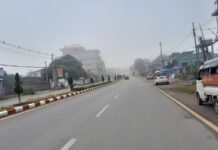On March 9, Zeid Ra’ad al-Hussein, U.N. High Commissioner for Human Rights told a news conference at the United Nations in Geneva, Switzerland that he suspected “acts of genocide” against the Rohingya Muslim minority and should be referred to the International Criminal Court (ICC) for prosecution. Two days earlier, he called for a new body tasked with preparing criminal indictments over alleged atrocities committed in Myanmar, after a similar panel was created for the Syrian conflict.
To buttress his point, in his 37th session of the Human Rights Council Statement Zeid said: “Access for independent human rights monitoring is practically non-existent across Myanmar, but it appears clear that longstanding discriminatory policies and practices also continue against other groups. In Shan and Kachin states, civilian casualties continue to be reported as a result of attacks by the security forces.”
 Yanghee Lee, the U.N. investigator on human rights in Myanmar, who was not allowed to visit the country to investigate also echoed the U.N. High Commissioner for Human Rights, when she said that she was “increasingly of the opinion that the events bear the hallmarks of genocide” and said she would press for prosecutions for crimes committed against entire ethnic and religious groups.
Yanghee Lee, the U.N. investigator on human rights in Myanmar, who was not allowed to visit the country to investigate also echoed the U.N. High Commissioner for Human Rights, when she said that she was “increasingly of the opinion that the events bear the hallmarks of genocide” and said she would press for prosecutions for crimes committed against entire ethnic and religious groups.
“The government leadership who did nothing to intervene, stop, or condemn these acts must also be held accountable,” Lee added.
Available statistic indicated that some 700,000 Rohingya have fled to Bangladesh, due the area clearance of Myanmar security forces’ military operations, a highly disproportionate response stemming from Arakan Rohingya Salvation Army (ARSA) attacks on government outposts, leaving more than 6700 death in the first month of a crackdown that started in August 2017 in northern Rakhine state, according to Médecins Sans Frontières. The Myanmar government gave a much lower death count which is said to be some only 400.
According to the ASEAN Parliamentarians for Human Rights (APHR), citing data from the Bangladeshi government, 28,300 Rohingya children who fled to Bangladesh from Myanmar have lost at least one parent, while an additional 7,700 children reported having lost both parents. That puts the number of “lost” parents as high as 43,700, according to APHR, adding that it is unclear how many of the children are siblings and may have lost the same parent, according to the recent Time report of March 7.
However, the Myanmar’s National Security Advisor Thaung Tun who is leading the lobbying group to dispel Myanmar’s negative image in a more pro-active mode, rather than traditionally reacting to the accusation, in a press conference in Geneva retaliated: “We often heard many accusations that there is ethnic cleansing or even genocide in Myanmar … it is not the policy of the government”, adding, “Whenever there is clear evidence we will make sure that action is taken against those who have perpetrated any crimes or those who have cause human rights abuses.”
Zeid, when asked about the remarks, said that Myanmar authorities were “serial deniers of the truth”, adding: “To suggest that nothing serious has happened in Rakhine, I mean it’s preposterous, ridiculous. How can they say such a thing?”, according to the Reuters report.
Apart from that he said the vast majority of Rohingya remained in the villages, and added had it been a genocide attempt they all would surely have fled the region.
“The very fact that Myanmar is willing to take back people who have crossed over the border” from Bangladesh indicates “we are not planning to have them out of the country,” he reasoned further.
Another explanation of the exodus by the Tatmadaw or the Military is that the ARSA members that attacked the security outposts in August could be more than 4000 and instead could be 10,000 to 20,000. And if one counted all their family members, the insurgents might number around 200,000, according to the BBC March 9 report.
Moreover, Thaung Tun said the Rohingya fled largely because the ARSA armed group had sowed fear, accusing it of having forced villagers to join their attacks on the security forces and had insisted on a scorched-earth policy, by burning villages in retreat.
Earlier, in last September, the graves of some 40 massacred Hindus was discovered, which was roundly blamed on the Rohingya militants by the Tatmadaw, although the former rejected it, amounted to an act of “whataboutism” or “whataboutery”.
According to Merriam Webste Dictionary, “The tactic behind whataboutism has been around for a long time. Rhetoricians generally consider it to be a form of tu quoque, which means “you too” in Latin and involves charging your accuser with whatever it is you’ve just been accused of rather than refuting the truth of the accusation made against you.”
In sum whether the Thaung Tun’s pro-active lobby team, entrusted with the task to turn the negative international opinion around will be able to deliver a positive result, with the following undertakings, is unclear.
They are:
- The usual denial and the demand for clear evidences;
- Prohibiting UN investigators’ access to the crime scene in Rakhine state, accusing that their observation were negatively biased against the government from the outset;
- Suggestions that ARSA could be as many as 200,000 members strong fleeing the security crackdown and in process had ordered to burn down their own houses;
- Bulldozing and destroying crime evidences with the pretext to build new housing facilities for the returnees;
- Promises to implement the Kofi Annan Commission’s 88-point recommendation together with the UN; and
- Arrangement of some 100 journalists whom the government had already flown to Rakine state on guided tours that would also be expanded in the future.
Furthermore, the more than 40,000 missing parents in the exodus also needs to satisfactorily explained and clarified, needless to say of the agreement on the humane, secure and dignified repatriation of the refugees, if the international mood on Myanmar is to be altered for the better and the stigma of crime against humanity is to be erased. There is hardly any other way out.











Leave a Comments